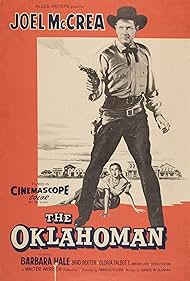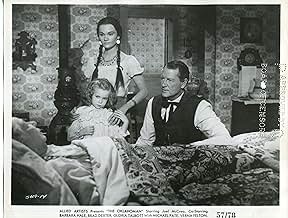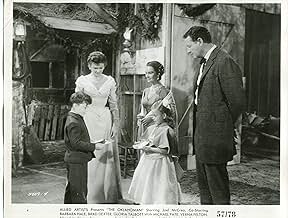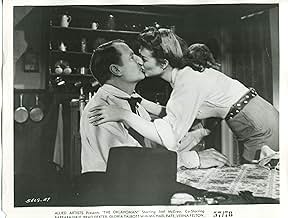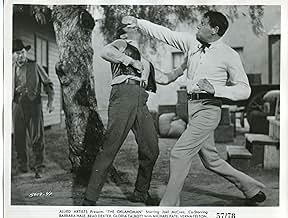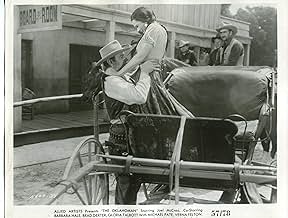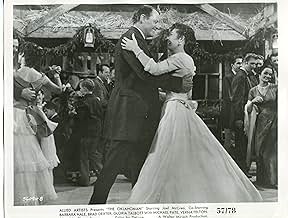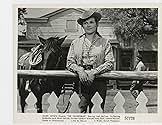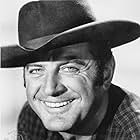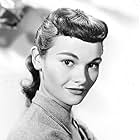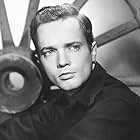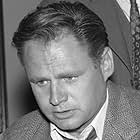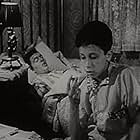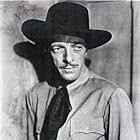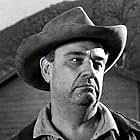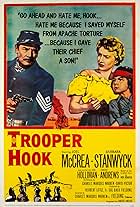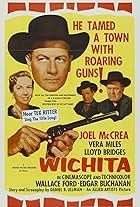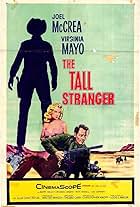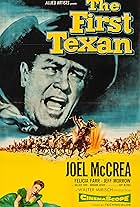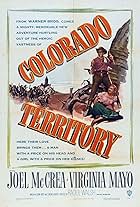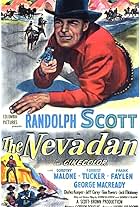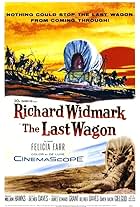A doctor stops in a small Southwestern town to bury his wife. He decides to stay there and start a practice, but soon runs into violent cattle ranchers.A doctor stops in a small Southwestern town to bury his wife. He decides to stay there and start a practice, but soon runs into violent cattle ranchers.A doctor stops in a small Southwestern town to bury his wife. He decides to stay there and start a practice, but soon runs into violent cattle ranchers.
Peter J. Votrian
- Little Charlie
- (as Peter Votrian)
I. Stanford Jolley
- Storekeeper
- (as Stanford I. Jolley)
Fred Aldrich
- Townsman at Barn Dance
- (uncredited)
Gertrude Astor
- Townswoman Gossip
- (uncredited)
Walter Bacon
- Townsman at Barn Dance
- (uncredited)
- Director
- Writer
- All cast & crew
- Production, box office & more at IMDbPro
Storyline
Did you know
- TriviaThe last film starring Barbara Hale to be released before she began her stint as Della Street in Perry Mason (1957) in September 1957.
- ConnectionsReferenced in By Design: The Joe Caroff Story (2022)
Featured review
As the title might suggest, "The Oklahoman" is set in Oklahoma, although that does not automatically follow; "The Virginian", after all, is not set in Virginia. The action takes place during the 1870s, at a time when Oklahoma was still known as the Indian Territory and was officially reserved for Native Americans, although in fact it also had a sizeable white population.
John Brighton is a doctor whose wife dies in childbirth while they are on a westward-bound wagon train. Dr Brighton abandons his plans to move to California and decides to settle in the small town of Cherokee Wells. The main action takes place several years later. Brighton has established his practice in the town, but becomes embroiled in a land dispute between greedy rancher Cass Dobie and a small Indian farmer; Dobie has discovered that there is oil on the Indian's land and wants to force the rightful owner off. Another strand to the plot involves Brighton's love life. Although Joel McCrea was in his fifties when the film was made, Hollywood has never had any problems with older man/younger woman love stories, and such stories were particularly prevalent in the 1950s. Brighton therefore finds that two beautiful young women, one white and one Indian, have fallen madly in love with him.
No prizes for guessing which of the girls eventually wins out. The film's politics on racial issues are, by the standards of the fifties, mildly liberal, but that liberalism does not extend to matters of the heart. The film's attitude towards Native Americans, in fact, is that they deserve to be treated as equals by the white man, provided that they assimilate into white culture and adopt the white man's ways. Dr Brighton's friend as a young man fought for his tribe against the whites, but after being defeated has given up his traditional lifestyle and taken up farming. Most Indians in Westerns have names like "Running Bear" or "Red Eagle", but this one has the distinctly Anglo-Saxon moniker of Charlie Smith.
This film appears to have been made as a B-movie and is not, by any means, well-known today; I note that mine is only the third review it has received on this board. Before I recently caught it on television I had never heard of it or of its director Francis D. Lyon, and its star McCrea was best known to me for his role in Hitchcock's "Foreign Correspondent", even though in the latter part of his career he specialised almost exclusively in Westerns.
Yet this is a film which I feel deserves to be better known. There is a good performance from McCrea in the leading role as a peaceful, mild-mannered man whose sense of honour demands that he should make a stand against injustice. (A frequent Western theme. Brad Dexter is also good as the villain Dobie, adept at using a mask of sweet reasonableness to hide the fact that he is by nature an unpleasant bully, and Barbara Hale and Gloria Talbott make a lovely pair of young heroines. The film has a strong storyline, and moves along at a brisk pace, leading to the inevitable climax. "The Oklahoman" may not be in the same league as the great Westerns of the fifties (films like "High Noon", "Shane" or "The Big Country"), but it is a good example of a very decent second division Western. 7/10
John Brighton is a doctor whose wife dies in childbirth while they are on a westward-bound wagon train. Dr Brighton abandons his plans to move to California and decides to settle in the small town of Cherokee Wells. The main action takes place several years later. Brighton has established his practice in the town, but becomes embroiled in a land dispute between greedy rancher Cass Dobie and a small Indian farmer; Dobie has discovered that there is oil on the Indian's land and wants to force the rightful owner off. Another strand to the plot involves Brighton's love life. Although Joel McCrea was in his fifties when the film was made, Hollywood has never had any problems with older man/younger woman love stories, and such stories were particularly prevalent in the 1950s. Brighton therefore finds that two beautiful young women, one white and one Indian, have fallen madly in love with him.
No prizes for guessing which of the girls eventually wins out. The film's politics on racial issues are, by the standards of the fifties, mildly liberal, but that liberalism does not extend to matters of the heart. The film's attitude towards Native Americans, in fact, is that they deserve to be treated as equals by the white man, provided that they assimilate into white culture and adopt the white man's ways. Dr Brighton's friend as a young man fought for his tribe against the whites, but after being defeated has given up his traditional lifestyle and taken up farming. Most Indians in Westerns have names like "Running Bear" or "Red Eagle", but this one has the distinctly Anglo-Saxon moniker of Charlie Smith.
This film appears to have been made as a B-movie and is not, by any means, well-known today; I note that mine is only the third review it has received on this board. Before I recently caught it on television I had never heard of it or of its director Francis D. Lyon, and its star McCrea was best known to me for his role in Hitchcock's "Foreign Correspondent", even though in the latter part of his career he specialised almost exclusively in Westerns.
Yet this is a film which I feel deserves to be better known. There is a good performance from McCrea in the leading role as a peaceful, mild-mannered man whose sense of honour demands that he should make a stand against injustice. (A frequent Western theme. Brad Dexter is also good as the villain Dobie, adept at using a mask of sweet reasonableness to hide the fact that he is by nature an unpleasant bully, and Barbara Hale and Gloria Talbott make a lovely pair of young heroines. The film has a strong storyline, and moves along at a brisk pace, leading to the inevitable climax. "The Oklahoman" may not be in the same league as the great Westerns of the fifties (films like "High Noon", "Shane" or "The Big Country"), but it is a good example of a very decent second division Western. 7/10
- JamesHitchcock
- Jan 4, 2012
- Permalink
- How long is The Oklahoman?Powered by Alexa
Details
- Runtime1 hour 20 minutes
- Color
- Aspect ratio
- 2.35 : 1
Contribute to this page
Suggest an edit or add missing content

